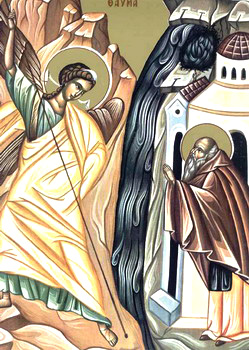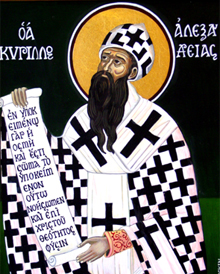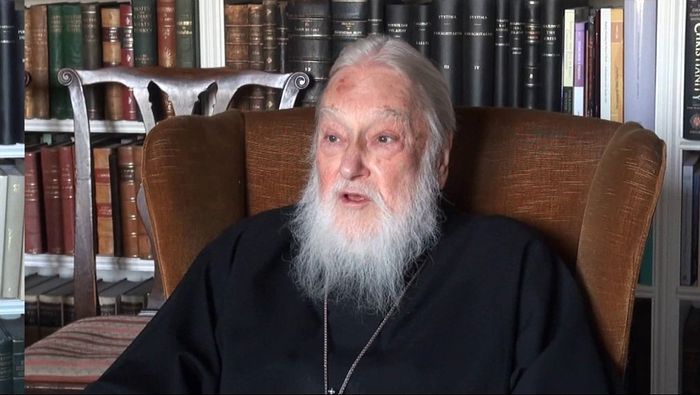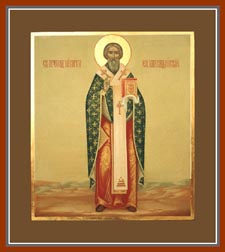Science
Holy Apostle Bartholomew
24. June 2018 - 13:07 The Holy Apostle Bartholomew was born at Cana of Galilee and was one of the Twelve Apostles of Christ. After the Descent of the Holy Spirit on the Day of Pentecost, it fell by lot to the holy Apostles Bartholomew and Philip (November 14) to preach the Gospel in Syria and Asia Minor. In their preaching they wandered through various cities, and then met up again. Accompanying the holy Apostle Philip was his sister, the holy virgin St Mariamnne.
The Holy Apostle Bartholomew was born at Cana of Galilee and was one of the Twelve Apostles of Christ. After the Descent of the Holy Spirit on the Day of Pentecost, it fell by lot to the holy Apostles Bartholomew and Philip (November 14) to preach the Gospel in Syria and Asia Minor. In their preaching they wandered through various cities, and then met up again. Accompanying the holy Apostle Philip was his sister, the holy virgin St Mariamnne.
Traversing the cities of Syria and Myzia, they underwent much hardship and tribulations, they were stoned and they were locked up in prison. In one of the villages they met up with the Apostle John the Theologian, and together they set off to Phrygia. In the city of Hieropolis by the power of their prayers they destroyed an enormous viper, which the pagans worshipped as a god. The holy Apostles Bartholomew and Philip with his sister confirmed their preaching with many miracles.
St. Cyril the Archbishop of Alexandria
23. June 2018 - 15:20 Saint Cyril, Archbishop of Alexandria, a distinguished champion of Orthodoxy and a great teacher of the Church, came from an illustrious and pious Christian family. He studied the secular sciences, including philosophy, but most of all he strove to acquire knowledge of the Holy Scriptures and the truths of the Christian Faith. In his youth Cyril entered the monastery of Macarius in the Nitreia hills, where he stayed for six years. Theophilus (385-412), the Patriarch of Alexandria, ordained him as a deacon, numbered him among the clergy and entrusted him to preach.
Saint Cyril, Archbishop of Alexandria, a distinguished champion of Orthodoxy and a great teacher of the Church, came from an illustrious and pious Christian family. He studied the secular sciences, including philosophy, but most of all he strove to acquire knowledge of the Holy Scriptures and the truths of the Christian Faith. In his youth Cyril entered the monastery of Macarius in the Nitreia hills, where he stayed for six years. Theophilus (385-412), the Patriarch of Alexandria, ordained him as a deacon, numbered him among the clergy and entrusted him to preach.
Upon the death of Patriarch Theophilus, Cyril was unanimously chosen to the patriarchal throne of the Alexandrian Church. He led the struggle against the spread of the Novatian heresy in Alexandria, which taught that any Christian who had fallen away from the Church during a time of persecution, could not be received back into it.
Metropolitan Kallistos and The Wheel
20. June 2018 - 10:06 I owe a great debt of gratitude to Metropolitan Kallistos—or at least to Timothy Ware. I read his book The Orthodox Church long ago and it was an important part of my conversion to Orthodoxy. I still have the somewhat battered volume on my bookshelf, a gold bishop’s mitre on the cover set off against a black background. That was before Timothy became Kallistos and parenthesized his surname, and I have followed his ecclesiastical promotion and the consequent name changes as he became a priest, then an archimandrite, and then a bishop, and then finally a metropolitan.
I owe a great debt of gratitude to Metropolitan Kallistos—or at least to Timothy Ware. I read his book The Orthodox Church long ago and it was an important part of my conversion to Orthodoxy. I still have the somewhat battered volume on my bookshelf, a gold bishop’s mitre on the cover set off against a black background. That was before Timothy became Kallistos and parenthesized his surname, and I have followed his ecclesiastical promotion and the consequent name changes as he became a priest, then an archimandrite, and then a bishop, and then finally a metropolitan.
Saint Nicetas, Confessor and Bishop of Chalcedon Whom We Comemorate Today
10. June 2018 - 15:42 In his youth, he renounced the world and withdrew to a life of monastic asceticism. Shining like the sun with virtues, he was noticed by the elders of the Church and was elevated to the episcopal throne of Chalcedon. As a bishop, he was especially merciful toward the less fortunate, and he greatly concerned himself with the welfare of orphans, widows and the poor. When the evil Leo the Armenian rose up against the icons, Nicetas courageously stood up in their defense, denouncing the emperor and explaining their meaning. Consequently, he endured great humiliation, calumny and imprisonment. He was finally banished into exile for his confession of Faith, and in labors and sufferings presented himself to the Lord to receive a wreath of glory in the Kingdom of God.
In his youth, he renounced the world and withdrew to a life of monastic asceticism. Shining like the sun with virtues, he was noticed by the elders of the Church and was elevated to the episcopal throne of Chalcedon. As a bishop, he was especially merciful toward the less fortunate, and he greatly concerned himself with the welfare of orphans, widows and the poor. When the evil Leo the Armenian rose up against the icons, Nicetas courageously stood up in their defense, denouncing the emperor and explaining their meaning. Consequently, he endured great humiliation, calumny and imprisonment. He was finally banished into exile for his confession of Faith, and in labors and sufferings presented himself to the Lord to receive a wreath of glory in the Kingdom of God.
Sola Scriptura
9. June 2018 - 19:14 Most Evangelical Protestants do not have a great love for Latin (people of my vintage can remember when Latin was inevitably associated in Evangelical minds with the horrible benighted Catholics, who used Latin as their liturgical language), but there are two Latin words very close to their hearts: “sola Scriptura”, which is Latin for “Scripture alone”. Those dipping a little into Reformation history will recall that it shared the stage with a few other Latin slogans, such as “sola fide” (faith alone), “sola gratia” (grace alone), and “solus Christus” (Christ alone). The words formed something like a banner, a code for the entire Reformed package—and sometimes a war-cry shouted when going into ideological battle.
Most Evangelical Protestants do not have a great love for Latin (people of my vintage can remember when Latin was inevitably associated in Evangelical minds with the horrible benighted Catholics, who used Latin as their liturgical language), but there are two Latin words very close to their hearts: “sola Scriptura”, which is Latin for “Scripture alone”. Those dipping a little into Reformation history will recall that it shared the stage with a few other Latin slogans, such as “sola fide” (faith alone), “sola gratia” (grace alone), and “solus Christus” (Christ alone). The words formed something like a banner, a code for the entire Reformed package—and sometimes a war-cry shouted when going into ideological battle.
Saint of the Day: Third Finding of the Head of John the Baptist
7. June 2018 - 14:49![]() Third Finding of the Head of Saint John the Baptist
Third Finding of the Head of Saint John the Baptist
There are not enough days in the calendar year to set aside one for every religious commemoration. But of the 365 days of the solar year allowed us, each could bear some mention of the great St. John the Baptist without wearing thin the reputation of this mighty figure of Christianity. Referred to as the prefiguration of Jesus Christ, he is remembered on more than one occasion even though it is in seemingly grisly reference to the head that was severed from his body to grant a favor by a callous monarch to a scatterbrained girl.
The eminent St. John the Baptist is commemorated by the Greek Orthodox Church in five different observances as follows: (1) the Conception of St. John the Baptist on September 23, (2) the Nativity of St. John the Baptist on June 24, (3) the official Feast Day of St. John the Baptist on January 7, (4) the First and Second Findings of the Relics of St. John on February 24, and (5) the Third Finding of the Relics of St. John on May 25. It is only fitting that St. John, the forerunner of the Savior for whom he prepared the way, be given at least these five commemorative days, if only for the fact that Jesus Himself said of him in the Gospel of St. Luke (7:25-28): “Behold, they which are gorgeously appareled and live delicately in the king’s court. But what went ye out for to see? A prophet? Yea, I say unto you, and much more than a prophet. This is he, of whom it is written. Behold, I send my messenger before thy face which shall prepare the way before thee. For I say unto you, among those who are born unto woman, there is no greater prophet than John the Baptist; but he that is least in the Kingdom of God is greater than he...”

